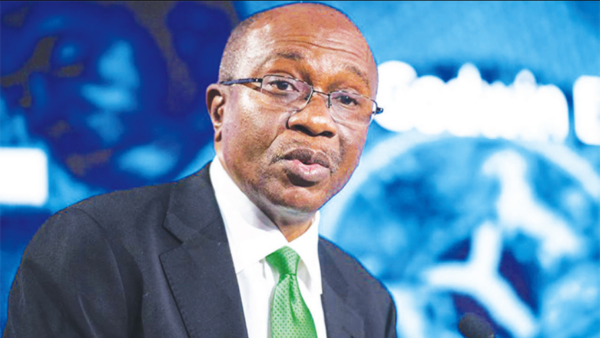Mr. Godwin Emefiele, Governor of the Central Bank of Nigeria (CBN), yesterday stated that regulators in Nigeria would continue to keep their eyes on banking system stability, through monitoring and supervision of financial institutions, in the wake of the recent collapse of Silicon Valley Bank and Signature Bank in the United States, which heightened concerns of a likely global banking crisis.
In a discussion with reporters on the eve of the IMF/World Bank Spring Meetings in Washington, DC, Emefiele made this statement.
Furthermore, he said that the International Monetary Fund’s (IMF) backing of the CBN’s restrictive monetary policy was further evidence that the CBN was on the right track.

Ugo Aliogo, Funke Olaode, and Nume Ekeghe at the Nation’s Capital
The focus of monetary policy and the attention of monetary authorities must thus remain on reducing inflation. While monetary authorities are working to reduce inflation, Emefiele said they must also keep an eye on the soundness of financial institutions through monitoring, supervision, and regulatory frameworks and the like.
He remarked, “It gladdens our heart that the IMF would say that, among all the countries in Africa, growth in Nigeria should be retained at 3.2 percent, even though by our assessment is still sub-optimal.”What this says is that we are doing the right things and will keep doing them. What this also means, though, is that we won’t take our gaze off of monetary policy, the primary goal of which is to keep inflation in check while also ensuring the continued strength and resilience of the financial system.
As the spring meetings come to a close today, Emefiele spoke on the big picture, noting that world leaders had gathered to discuss ways to address pressing problems including the food crisis, growing poverty, and global inflation.
The CBN governor is overjoyed by the IMF’s backing of strict monetary policy.
He said, “The projection at the conference is that sure, a lot of work has been done in 2022, and growth is gradually returning again, but it is still at the sub-optimal level. Although monetary authorities have taken steps to reduce inflation, price increases continue to be substantial around the world; in fact, even though global inflation is forecast to be 7%, it is still at very high levels.

And the pinnacle of all the repercussions of 2022 is the increase in poverty, which was very extensively highlighted here, and the fact that over 700 million people are now living in poverty throughout the world.
“Over 350 million people worldwide are hit by extreme food crises,” as a result of the growth in food insecurity.
And he said that multilateral organizations were increasingly hesitant to lend to countries in need because of the increase in global debt.
“Even the IMF themselves also talked about the fact that even the debt portfolios and lending portfolios have reached all-time highs,” the CBN governor explains. The IMF’s debt portfolio is at its highest level in two decades, and the organization is warning that it may be unable to assist nations that need additional financing in order to reorganize their balance sheets and continue operations.
For the fiscal side of things, of course, because of the limited fiscal space, the IMF demands that countries need to lower their spending, but in my case, I will say well, if you want to spend, then grow income to be able to spend.
“I think it’s important that you must raise revenue and not get yourself constrained in an environment where there is no debt, where financial market conditions are very tight and very limited, and where interest rates are high and could create a lot of burden for economies,” said the official. “The only option for fiscal in this case is to expand the revenue base so as to be able to spend.”

